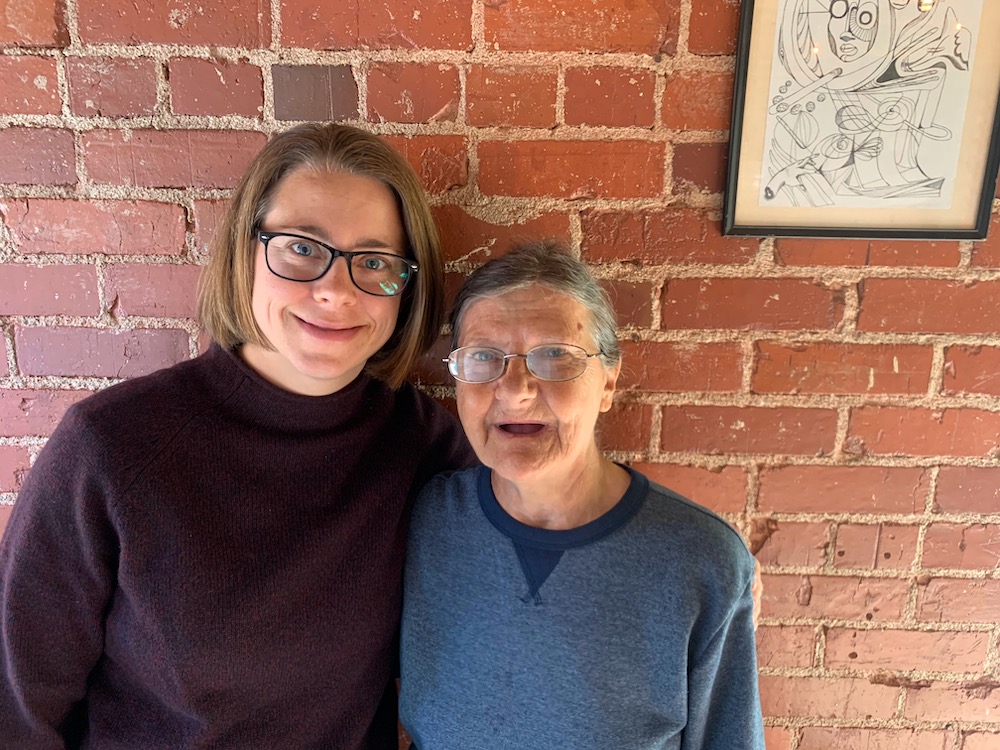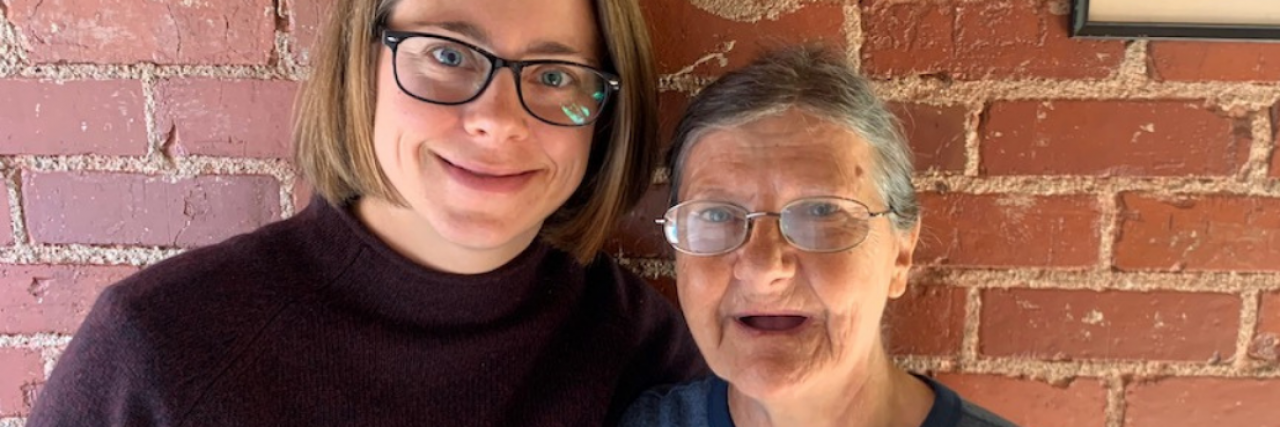I Don’t Have to Take Care of My Elderly Abusive Mother
Editor's Note
If you’ve experienced domestic violence or emotional abuse, the following post could be potentially triggering. You can contact The National Domestic Violence Hotline online by selecting “chat now” or calling 1-800-799-7233.
You can contact the Crisis Text Line by texting “START” to 741741.
I left home at the age of 20, during my sophomore year of college. My mother didn’t even realize I was moving out because I did it secretly: During a weekend home, I packed only what I wanted to keep and wouldn’t be missed, and left everything else behind. I left a letter in our mailbox explaining why I was moving out, where I would be, and how my mother could reach me. To say it was a big step is an understatement. For me, it was like taking a jump and landing on the moon.
My mom was abusive and controlling my whole life with her. She was a single mom and I was an only child (though later, I would learn that I had an older sister 15 years my senior, who also left home at only 15 years old).
Growing up, my mom was a pinball machine that resulted in her being constantly angry, depressed, anxious, fearful, narcissistic, and paranoid — the effects of which were all aimed at me, the only other person around. She was emotionally explosive. There was the time I was ordered to sleep outside because of something I’d done, despite it being winter. I was eventually allowed to sleep by the house’s front door only after much crying and begging. I was often spanked (beaten) so hard that she broke objects over my body — one that sticks out in my memory is a thick wooden kitchen spoon. And there was a time when I was about 9 years old and my mother imagined that I was stealing wine from a bottle she’d hidden, so she forced me to drink a 16-ounce glass of wine to teach me a lesson. I’ll leave to the imagination what happens when a 9-year-old drinks over three servings of wine. There are many more episodes like these.
So, as soon as I was able, I left my home. A few months later, I apologized for how I handled the situation and attempted to reconcile with my mother, only to be given a moving truck full of my belongings and a warning never to speak to her again.
Fast-forward 18 years. I am married and have six children of my own, and live on the other side of the country. Through a series of phone calls from strangers, I learn that my mother is in poor health and needs help. I visit her for the first time in 18 years and realize that she cannot live independently anymore. She is alone and needs to be closer to me because I can’t keep flying across the country to help her.
It was both a hard and an easy decision to move her to our town. I am a Christian, so some principles guide my life and inform my decisions. One is honoring my parents. Another is caring for widows, and another is showing love to my enemies. I know it’s the right thing to do, but it’s still hard because I know it will be painful. So I make the arrangements for her to move closer to us. We find an apartment a mile away and fill it with furniture I find at thrift stores. I fly across the country one last time to pack her up and bring her out. I steel my mind for this new chapter and tell myself just to treat her like a “normal” person. Maybe a distant aunt.
At first, it’s easy to have compassion for her. She is, after all, an old lady. She needs help with daily tasks. She doesn’t drive, so I do her grocery shopping. She doesn’t understand what goes on at her doctor visits, so I accompany her and interpret what she needs to know. My husband handles her finances and helps her pay her bills.
And then there is the emotional side: she doesn’t address the previous 18 years. It’s as if they never happened and life has been “normal.” She acts like a “normal” mother. She comes over to our house for Christmas. She wants to take me out for lunch when it’s my birthday. My brain is confused because I don’t know how to fit this new person into my adult life, especially when I can’t stand to be around her. Even seeing her handwriting on a grocery list fills me with anxiety.

Things go relatively smoothly for a while. It’s not easy managing another adult’s whole life, and it’s not easy incorporating a new grandparent into our family life, but we eventually seem to adjust to our new normal.
Until we don’t.
My mom ends up with a three-month-long health issue resulting in surgery and a weeks-long recovery. This means many more doctor appointments and much more hands-on care. I already know that I can’t bear being around her for more than a few hours at a time, so for weeks my husband and I trade shifts to care for her. All while still juggling our own family. There are mystery skin rashes to diagnose, diabetic emergencies, emotional meltdowns, taking kids to jobs, school meetings, and the normal chaos that comes with having six kids.
I knew something had to change.
Being around my mom so often brings up a lot of crud from my childhood. I am still angry with her for how she treated me as a child. And I am resentful that she is taking time away from my own children and causing me to be more like the mother she was and less like the mother I want to be. But I can’t show my anger. As a child, and now as an adult, I have to keep a lid on my emotions because I know if I show any anything besides cheerful acquiescence, there will be a huge emotional scene from her, and I can’t deal with that. As a child and even now as an adult, I use immense energy to stuff my emotions down and put a smile on my face.
After I left my mom’s house one day, utterly drained from interacting with her, and then having to go home and be a mom to my own kids, I knew something had to change. I talked to my therapist about what has been going on and she helps me realize something that now seems very obvious:
I don’t have to take care of my abuser. NO ONE expects me to take care of my abuser.
For some reason, hearing those words from someone else released me from the guilt I had been carrying: about hating being around my mother, being angry with her, not wanting to take care of her, and not being able to reconcile this new version of my mother with the abusive one I had known as a child. I let go of the guilt of wanting to help her, but also not wanting to be physically around her.
I still feel strongly that my mom needs to be taken care of. I can’t turn my back on her and let her survive alone. But that doesn’t mean that I have to be the one going to her house every day. I don’t owe her any more of my presence than is healthy for me to offer. I have my own family now and my own children to mother.
My husband is the main one that has difficult conversations with my mom because I cannot do it. So he talks with her and lets her know that we will be hiring a senior helper and that she will be paying for it. He framed it lovingly saying, “It seems like you need more help than we are able to give, and we don’t want you to go without the help you need.”
I am still in the middle of this, and I think it’s going to be an ongoing process. I’m still sorting out my feelings and trying to find a good balance of showing my mother love from afar and keeping my boundaries so that I can be the mom to my children that I never had.
More Resources
I realize that I am fortunate to have a supportive spouse who can help shoulder the burden of caring for an aging parent, and not everyone is in this position. Many state agencies offer help to the elderly. Eldercare Locator was helpful early in our search and locates resources in your area. Local churches can also help with meals and finding people qualified to help the elderly. If your parent has state Medicaid, there are many resources available, including transportation, in-home helpers, and more. Your area likely has local agencies that provide services for the elderly in the community.
I also have a therapist that I can afford because of my husband’s health benefits. Not everyone has this ability. BetterHelp is an excellent resource for people needing therapy, and their pay scale is very reasonable. I have used this service in the past and was happy with the care I received.
I posted a request on Nextdoor for qualified senior helpers and have received many responses that I’m still in the process of vetting. The great thing about Nextdoor is that it locates people right in a selected neighborhood or location and uses the power of word-of-mouth. Someone usually knows someone nearby that is interested in a caregiving job.
If you are in a similar position as I am, talk to someone. Find support. May you find the healing that you deserve.
Image via contributor

